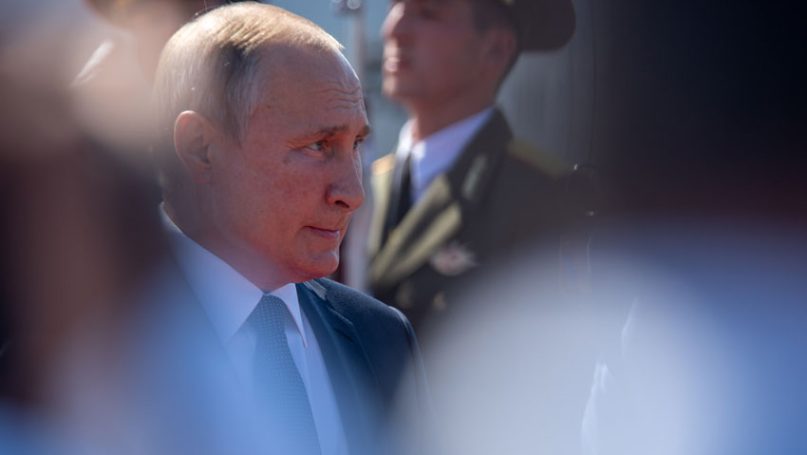
Putin has long believed that Russia deserves the status of great power. But the U.S. did not see it that way. Sure, Russia inherited the guns, tanks, nukes, and territory of a superpower. But post-Cold War Russia was never held in the same esteem as the Soviet Union was.
When states and their leaders feel that they do not get the recognition they deserve, they bicker, quarrel, and shout about it. Because they care about what others think of them. When shouting does not work, states go to war. Yes, states still fight for prestige in the 21st century. And depending on the audience, it sometimes works.
Russia’s 2014 annexation of Crimea and invasion of East-Ukraine is a case in point. These actions received mixed reactions. Groups like the G8 shunned Russia. U.S. Secretary of State John Kerry said that if “Russia wants to be a G8 country, it needs to behave like a G8 country.” Other leaders soon followed suit. Russia was expelled from the club. The G8 became the G7, and Russia’s status within the club vanished.
The United Nations Security Council also criticized Russia. But unlike in the G8, members here must interact with all the veto powers to get things done. As one diplomat told me, “even though we were hammering Russia on Ukraine in the morning, the Security Council was still conducting other business in the afternoon.” In sum, Russia’s status inside the UN Security Council remained the same.
Putin’s bid for great power status was more successful. President Obama initially dismissed Russia as a “regional power” after the 2014 annexation. But he later faced criticism for not recognizing the rise of great power rivalries. Even Senator John McCain, who once mocked Russia as a mere “gas station run by a corrupt, autocratic regime” later acknowledged the era of “great power competition with Russia and China.”
The Trump administration’s National Security Strategy reaffirmed the era of great power competition with Russia and China. And President Biden echoed the sentiment of his predecessor by referring to Russia and the United States as “two great powers”.
According to conventional wisdom in the West, Russia’s status in world politics has dropped since it invaded Ukraine last year. Russia’s poor military performance, the argument goes, voids Putin’s aspirations for increased respect and recognition as a great power.
However, early responses do not accurately predict future status. Russia faced mockery and outrage when it annexed Crimea and invaded Ukraine in 2014. But Russia’s status only took hold several years after Crimea was annexed. To be sure, Russia’s reputation is tarnished following its all-out war with Ukraine. But it is premature to claim that the country has lost all status.
Moreover, a nation’s standing is complex as there is no single, overarching rank in one global hierarchy. The 2014 conflict and Crimea annexation had mixed impacts on Russia’s standing among the great powers, in the G8, and in the UN Security Council. Different clubs, each with their own status systems, respond differently to the war.
Finally, military blunders do not guarantee a loss of status, even among the great powers. To be sure, a poor military performance can harm Russia’s position as a great power. Indeed, the Soviet Union’s failed war in Afghanistan and the 1989 withdrawal contributed to its loss of superpower status. But the United States retained its status despite losing the Vietnam War. And although the Suez crisis damaged the UK’s reputation, it is still considered a great power.
The quest for prestige and status in global politics is complex. But one thing is clear: Both Putin and Russia care about status, and the war in Ukraine is directly tied to their concern for prestige. This begs the question, if states recognize Russia’s claim for status, could the ongoing bloodshed in Ukraine stop?
No. Giving status to appease is a bad and dangerous strategy. Rewarding belligerence will only encourage further conflict and signal to other rising powers – like China, India, Brazil, Japan, and Germany – that waging war is an effective means to accrue prestige.
Instead, the best long-term strategy is to not repeat the mistake of recognizing Russia’s bid for great power status after the annexation of Crimea in 2014. This involves breaking with established rhetoric that connects war with great power status.
This is a challenging task. The link between great power status and war has developed over centuries. Breaking it will require time, energy, and persistence from state leaders. Chances are we will not be able to replace them before the war in Ukraine ends. But the international society will be better off in future if major powers do not gain prestige from fighting.
Further Reading on E-International Relations
- With Great Power Comes Great Climate Responsibility
- A Recessional Power: How Britain’s Claim to Be a Great Power Has Been Fatally Undercut
- Opinion – A Hidden Victory? The Winter War and Russia’s Invasion of Ukraine
- Great Power Management of the Ukraine Conflict
- Opinion – Building the EU Narrative Towards Great Power Status
- Opinion – The Risk of Nuclear War with Russia